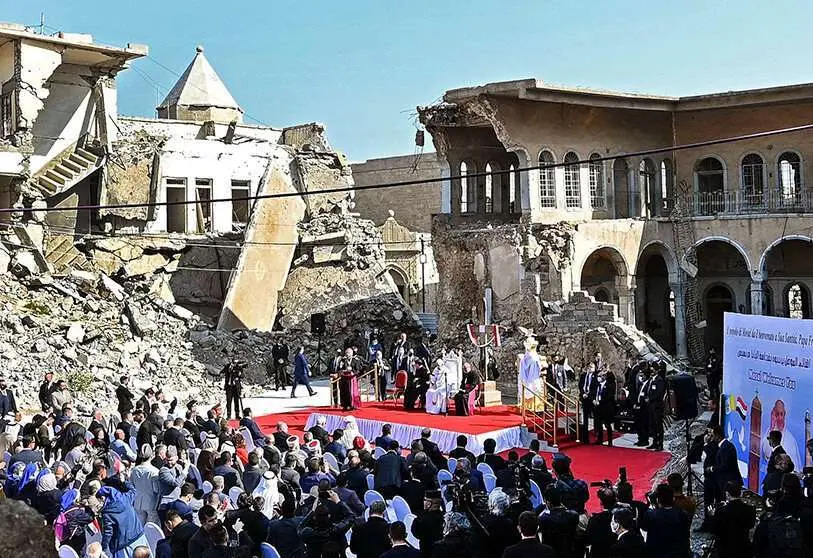A Pope in the heart of the world

Francis, the 266th Pope of the Roman Catholic, Apostolic and Roman Catholic Church, completed with undoubted success the most daring journey of his pontificate. A religious journey, of course, to several cities in Iraq, ancient Mesopotamia, the birthplace of Abraham, the father of the three monotheistic religions, and, consequently, of the civilisation that has marked the history of the world for the last 5,000 years. It also, of course, has political consequences, which can be described as positive insofar as it has shown that fraternal feelings of respect, unmistakable symptoms of hope, can rise above the rubble of hatred and war.
This elderly Pope, 84 years old and suffering from a number of ailments, has ignored all the calls for "prudence" that advised against the trip. A journey that John Paul II, the most travelled pontiff in history, could not make, nor could Benedict XVI, one of the most profound and brilliant intellectuals of the last decades at the crossroads of the 20th and 21st centuries. None of the previous occupants of St. Peter's chair had returned to the very cradle of civilisation, corresponding geographically to Iraq, a country that President George W. Bush had promised to return to the stone age. And, by dint of the fearsome dictatorship of Saddam Hussein, the bloody war of attrition with Iran, the two wars against the United States waged by Bush senior and Bush junior, and the brutal caliphate of Daesh, they have come close.
Iraq's wounds are still open and will not heal easily. In addition to the immense material destruction that will take a long time to rebuild, hatred has gripped many hearts. The Sunnis, dominant under Saddam, crushed the Shiite majority while the extremist Sunnis of Daesh declared all-out war on the Shiites of Iraq and Syria, but above all on the Christians, Mandaeans and Yazidis of ancient Mesopotamia. The looting, torture and all manner of exactions against them, widely broadcast around the world in technically impeccable videos, caused the Christian minority to flee and drastically shrink to barely 200,000 members from 1.5 million at the beginning of this century. And they encouraged many young European Muslims to embrace the most radical Islamism and embark on a so-called "jihad".
To this tiny Christian minority, Francis has brought the best possible message: to show them that they are not alone, to tell them that God has not abandoned them and that, despite all the aggressions and hardships they have suffered, it is possible for them to return to coexist in peace with believers in the same God, albeit through different religions. The Pope dismantled the dynamics of hatred which, as in so many other places in the world, had become established in the Middle East, a conglomerate in which it seems impossible to have any other kind of relationship than that of the language of force.
A cornerstone of the trip was the meeting with Ayatollah Ali Sistani, Iraq's main religious authority, from whom Francis obtained a promise to respect and protect this Christian minority in particular. A dialogue that also translates into the re-emergence of the Roman pope as a leading international political actor and interlocutor. A role that had been diminishing since the disappearance of John Paul II, much to the satisfaction of those who strive, especially in affluent Western societies, to destroy the cultural and civilising imprint of Christianity in general and Catholicism in particular, and to eradicate the more spiritual dimension of man, thus making him more easily manipulated.
In the homeland of Abraham, Pope Francis has not invented new messages. "True religiosity is to worship God and love one's neighbour. The most blasphemous offence is to profane the name of God by hating one's brother", or "fraternity is stronger than fratricide, hope is stronger than death, peace is stronger than war", can be subscribed to by any leader of good will who is not possessed by hatred and the desire for revenge.
Francis has been a pioneer in accompanying the Iraqi people as a whole on the arduous road to reconstruction. This was acknowledged by Iraqi President Barham Saleh in his farewell address. The country, it goes without saying, continues to be the scene of war, and therefore of the personal and collective struggle of its inhabitants for survival, which involves enormous corruption. This is nothing new, especially in such circumstances. The Pope, who, as Stalin pointed out, still has no military divisions, has nonetheless opened up a path of hope. It is up to the great leaders of the region and of the world to tread it and widen it or to persist in blurring it.

